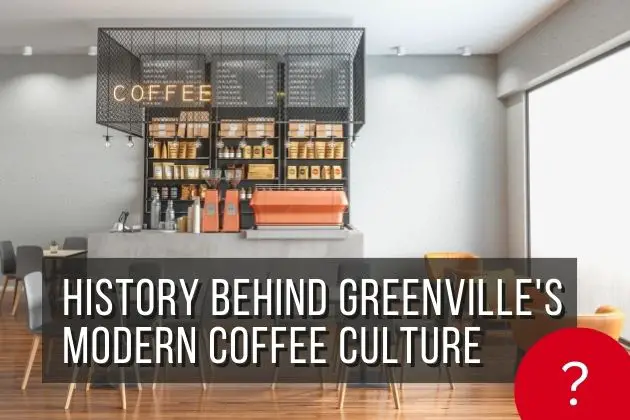Last Updated on May 1, 2023 by Timothy Byron Smith
Coffee culture has been a long-standing part of Greenville, South Carolina’s history, dating back to the late 19th century. In 1881, the local Woman’s Christian Temperance Union proposed a plan to create a coffee shop in an effort to combat the influence and use of saloons.
However, there seems to be no record of the coffee shop opening at that time. It was not until the 1920s, during Greenville’s textile-driven economic prosperity and building and population growth, that coffee shops began to show up in places such as the Imperial Hotel and Poinsett Hotel.
These early coffee shops in Greenville offered a convenient and relatively quick place to get a drink and affordable meal, much like their diner counterparts.

Prohibition in the 1920s and 1930s made coffee shops a viable alternative to the previous alcoholic-serving establishments. Soldiers during World War II were given a steady diet of coffee rations, which made the caffeinated drink a fixture in American society.
The creation of cafes by businesses like Peet’s and Starbucks in the 1960s and 1970s, which introduced not just a higher standard of freshly roasted beans but also a new, sociable coffee-shop experience, is when the modern coffee culture, however, first emerged.
Cities like Berkeley, California; Los Angeles; New York City; and Seattle were among the first to see the trend explode in the next decades. Coffee chains slowly spread around the country in both large and medium-sized cities.

Greenville’s first modern coffee shop, Barnie’s Coffee & Tea Co., opened in Haywood Mall in 1989. This coffee shop offered specialty drinks, bagged coffee, brewers, and gifts. The next one, the Table of Contents coffee shop, was not a national chain and was found within the popular local bookstore, The Open Book.
After these first two coffee shops, the 1990s saw an explosion of new shops opening up around Greenville. This growth was seen in the opening of coffee shops such as The Flatiron Coffee Shop, Coffee House at Little Stores of the West End, Hungs Coffee Shop, Metro Coffeehouse, and a few more bookstore cafes.
New restaurants like Bistro Europa and Brick Street Café and Coffee House also provided the coffee café experience. Espresso carts, such as Café Espresso at Haywood Mall and Pony Espresso at the Coffee Street Mall, popped up to serve the on-the-go crowd.
In the succeeding years, Greenville’s coffee culture continued to grow with favorites such as Beano Bros, Coffee Beanery, Joe Muggs, Coffee & Crema, and Coffee to a Tea. The longest-running coffee shop is Coffee Underground, which opened in 1995 as a brick-and-mortar outgrowth of the Pony Espresso cart.
Dana Lowie was an original owner and remains in charge, recently overseeing a renovation of the nostalgic and cozy café. It’s no coincidence that Greenville’s explosion of coffee shops coincided with the first airing of the TV show “Friends” with its Central Perk Café as the social hangout for the young crowd.
Greenville’s coffee scene has grown to the point where Fodor’s Travel ranked it in the top 22 American coffee destination cities.
In 2022, the Greenville Coffee Tour was created to feature choices of Greenville coffee shops, currently including Coffee Underground, Unlocked Coffee Roasters, and Mountain Goat Coffee. This tour offers guests the chance to enjoy freshly roasted coffee drinks and scratch-made food, as well as insights into coffee history and production.
All in all, Greenville’s coffee culture has a long history that dates back to the late 19th century. While the early coffee shops were primarily focused on providing a quick and affordable meal, the modern coffee culture that we know today emerged in the 1960s and 1970s with the advent of specialty coffee shops and a new, social coffee-shop experience.


